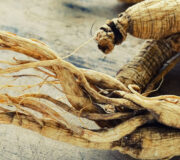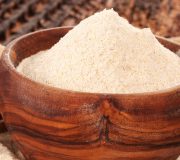Collinsonia Root Health Benefits
As the name suggests, the root of the Collinsonia plant is most often utilized, but the leaves are also associated with health benefits. Collinsonia leaves are traditionally used as a poultice to treat sprains, burns, bruises, ulcers, and other wounds, as it may improve capillary function and support speedy healing.
Historically, Collinsonia root has had many different associated health benefits and therapeutic uses, specifically for irritations of mucus membranes, supporting blood vessels of the venous system, and treating hemorrhoids. In fact, physicians most familiar with Collinsonia root and its uses said that Collinsonia is indicated in ailments that are characterized by “congestion, irritation, and a sense of constriction.”
Studies have shown that Collinsonia root contains phytoactive compounds like flavonoids and saponins. Phytoactive compounds are those found uniquely in plant-based foods. They support life and provide natural protection for both plants and people who eat plants. Research links flavonoids to anti-inflammatory activity, anti-microbial activity, and potential support of healthy metabolic function; saponins are associated with immune system support and healthy blood glucose and cholesterol levels. More on the phytoactive power of plants here.
Medicinal Value of Collinsonia Root
Collinsonia root (Collinsonia canadensis) is a unique plant that goes by many names: stone root, heal-all, knob-root, horse-balm, and many others, and its medicinal value stretches from burns to bruises. It is native to North America and grows in wooded areas from Canada to Florida. Today Collinsonia is wild harvested from public forests and cultivated under forest canopy. Named after the English botanist (and friend of Benjamin Franklin) Peter Collins, Collinsonia root was first used for medicinal purposes in the 1800s by the Shakers and Eclectic physicians, physicians known for their medicinal use of botanicals native to North America.
Collinsonia Root for Hemorrhoids
In the 21st century, collinsonia root is most commonly used in natural health care for the treatment of hemorrhoids, a condition of vascular irritation of the rectal area with a general sense of “constriction” or pain in the lower abdomen. Collinsonia root is used in particular for symptomatic hemorrhoids, the most common complaint in anus and rectal health issues. Symptoms can include rectal bleeding, tissue protrusion, and mucous discharge.
Other herbs used to treat hemorrhoid pain include butcher’s broom (Ruscus aculeatus), horse chestnut (Aesculus hippocastanum), witch hazel (Hamamelis virginiana), arnica (Arnica spp.), oak (Quercus spp.), chamomile (Matricaria recutita), gotu kola (Centella asiatica), calendula (Calendula officinalis), and psyllium (Plantago ovata seed). Herbalists may recommend that in treating hemorrhoids, utilizing a variety of herbal remedies is key for success as well as eating fruits and vegetables, staying hydrated, and being physically active.
Blood Vessel Support
Hemorrhoids are also considered a sign of portal system congestion, as well as a venous and capillary weakness, and so Collinsonia has become an important remedy in its treatment. Collinsonia root is used to support various circulatory conditions and is believed to help support the integrity of blood vessels, which is why it is sometimes used as a remedy for varicose veins. It has also been historically used as a tonic to support the blood vessels of the heart and cardiovascular system.
Respiratory Support
Since Collinsonia is regarded as a tonic for mucosa, it has been used for any irritation of the mouth and throat, including laryngitis, pharyngitis, and even bronchitis. One of collinsonia root’s earliest uses was for a specific type of laryngitis referred to as “minister’s sore throat.” This condition was described as resulting from the “prolonged and excessive use of the voice in a strained or unnatural key.”
Digestion Support
Collinsonia has been touted as a remedy for a wide variety of digestive issues, in addition to being a specific remedy for hemorrhoids. It was used to support the tone and mucosa of the digestive tract and to improve appetite, digestion, and assimilation of nutrients. It has also been used for diarrhea, constipation, and flatulence.
Collinsonia is a truly unique medicinal herb, as it gained popularity only in North America and has been used for such a wide variety of maladies unified by a narrow set of descriptors. Its reputation as a tried-and-true remedy for ailments characterized by “congestion, irritation, and a sense of constriction” make it relevant in many different conditions that still exist today, namely those that are related to venous weaknesses. While large scale studies to better understand the therapeutic effects of collinsonia root are lacking, the herb is still utilized today for many of the same conditions as it has been in the past.
Herbalists consider Collinsonia root for treating:
- Hemorrhoids
- Varicose veins
- Complaints of chronic constipation resulting in lower abdominal “pressure” or feelings of incomplete evacuation


















